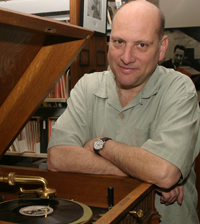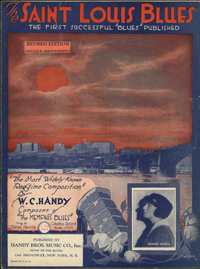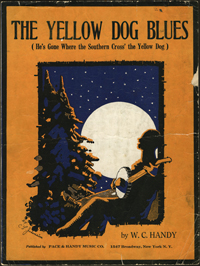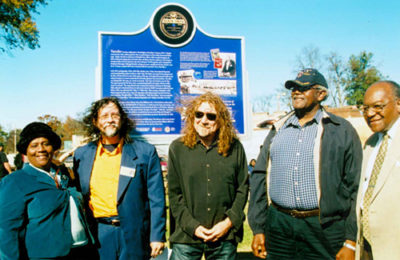Marr Sound Archives welcomes students, international researchers
As a record producer, record company executive and founding editor of Living Blues magazine, Jim O’Neal can glean information from an extensive network of record collectors and archivists.
However, only the University of Missouri-Kansas City Marr Sound Archives could help him with a Mississippi Blues Trail project commemorating the birthplace of blues – Tutwiler, Miss.

Chuck Haddix, sound recording specialist at Marr Sound Archives, responds to research requests from around the world.
O’Neal was searching for the Black Swan record label, which was the first African-American-owned label catering to the African-American market. Harry Pace and William C. Handy – a celebrated composer, publisher and bandleader recognized as the “father of blues” – launched the label in 1921.
When O’Neal arrived at Marr Sound Archives – located on the ground floor of the Miller Nichols Library, 800 E. 51st St. – sound recording specialist Chuck Haddix presented him with a stack of relevant records and articles. O’Neal left with information and photos of original record labels to place on a marker commemorating Handy and the birthplace of blues.
“It’s one of the rarest record labels, and I didn’t find it anywhere else,” O’Neal said. “Marr Sound Archives is certainly one of the best audio archives, and it’s great to have Chuck there so I can call him to ask reference questions.”
Birthplace of the blues

The Marr Sound Archives has preserved a copy of W.C. Handy’s “The St. Louis Blues” – one of the first blues songs, which was recorded in the early 1900s.
As the story goes, Handy’s 1903 encounter with a guitarist at a Tutwiler, Miss. train stop led to the style of music known as the blues. While waiting for his train to arrive, he noticed a man plucking a guitar beside him.
“As he played, he pressed a knife on the strings of a guitar in a manner popularized by Hawaiian guitarists who use steel bars,” Handy wrote in his autobiography, “Father of the Blues”. “The effect was unforgettable. His song, too, struck me instantly. ‘Goin’ where the Southern cross’ the Dog’. The singer repeated the line three times, accompanying himself on the guitar with the weirdest music I had ever heard.”
The song referred to the crossing of the Southern, Yazoo and Mississippi Valley (Y&MV) railroads in Moorhead, Miss. The Y&MV (sometimes called the Yazoo Delta or Y.D.) was nicknamed the “Dog,” or “Yellow Dog”.
After moving to Memphis, Tenn. in 1905, Handy adapted this style of music into a series of compositions that helped spark America’s first blues craze. Hit Handy’s Memphis Blues songs included “The Memphis Blues,” “The Yellow Dog Blues,” “The Beale Street Blues” and, most popularly, “The St. Louis Blues”. By 1919, Handy was hailed as “father of the blues”.
Based in New York, the Black Swan record label featured Handy’s music and compositions by other artists, such as Ethel Waters’ “Oh Daddy” and “Down Home Blues”. By July of 1923, though, business began to decline. In 1924, the Black Swan catalog merged with Paramount.
The legacy continues
Last year, Led Zeppelin vocalist and blues historian Robert Plant sponsored and spoke at the Tutwiler marker dedication. Plant spoke about Tutwiler’s significance in the history of blues music, and said he had visited Tutwiler several times to reflect on this significance.
The marker was funded in part by grants from the Federal Highway Administration, Mississippi Department of Transportation and the National Endowment for the Humanities. O’Neal, Tutwiler Mayor Genether Miller-Spurlock, former Tutwiler mayor Robert Grayson and Mississippi State Senator David Jordan also attended the dedication.
An international resource

W.C. Handy’s “The Yellow Dog Blues” refers to the crossing of the Southern, Yazoo and Mississippi Valley (Y&MV) railroads in Moorhead, Miss.
In addition to helping with national projects, Marr Sound Archives helps with international projects and assists the UMKC and local community. Last December, for example, a Japanese musician traveled to Kansas City to spend a week exploring the archives’ Raymond Scott collection. After studying the collection, the musician returned to Japan to create reissues of Scott’s work.
Each month, Haddix leads classes and individuals on instructional tours of the archives. One tour highlight is the “evolution of recorded sound,” which includes demonstrations of the ediphone and 1950s Rock-ola jukebox. Further along the tour, Haddix explains how the term “record album” originated in 1909. Pointing to a leather-bound album resembling a photo album, he explains that Tchaikovsky’s “Nutcracker Suite” was the first record composition distributed in a leather-bound album.
Established in 1987 with a foundation gift from Olga and Gaylord Marr, the Marr Sound Archives has grown to include more than 300,000 sound recordings. The focus of the collection is the American experience as reflected in recorded sound. The archives’ holdings include jazz, blues, country, bluegrass, spoken word, vintage radio programs, rock and roll, soul, opera, classical and several other music genres.
“What sets us apart is that we collect the American experience as reflected in recorded sound, and we’re service-oriented,” Haddix said. “Most sound archive libraries do not catalog their collections, but we do.”
While Marr Sound Archives explores the past, it also plans for the future. The Miller Nichols Library’s recent addition of a robotic storage and retrieval system – also known as the book robot – creates space for planned renovations and allows Marr Sound Archives to expand the breadth and depth of its collections. (Note: In celebration of the book robot, UMKC invites everyone to help break the Guinness World Record for the most people robotic dancing. For more information about this Sept. 27 event, visit http://www.umkc.edu/news/news-release.asp?id=935).
Marr Sound Archives is open from 9 a.m. to 4:30 p.m. Monday through Friday. Although appointments are not necessary, they are recommended for more in-depth research. To contact the Marr Sound Archives, call (816) 235-2798.

